What exactly is ballot harvesting? And what happened in Georgia?
While there is an investigation, it doesn't appear ballots were sold for "$10 a piece"
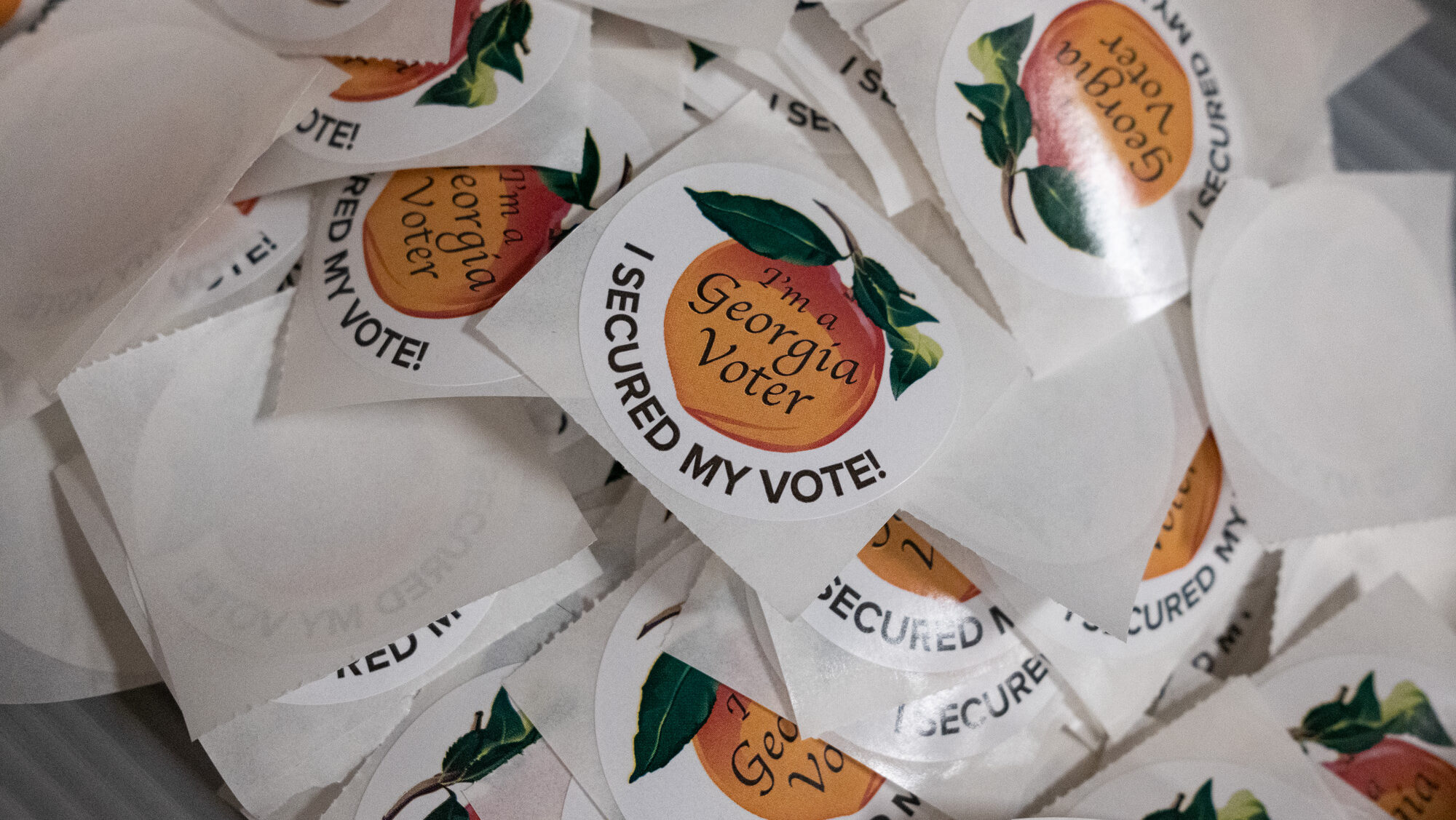
In response to President Biden’s January 6th address, former President Trump issued a number of missives which made a lot of accusations about the 2020 election (among other things). In keeping with his long-standing record of lying spreading misinformation about the election’s outcomes, Trump added in a new twist to an old claim:
“Where did all those votes show up from in Georgia, where it was just revealed they sold ballots for $10 a piece”
Full statement via twitter
Trump is referring to a recent announcement from Georgia Secretary of State Brad Raffensperger that his office has opened a new investigation into accusations of “ballot harvesting” in the 2020 Presidential election. The allegation, brought forward by a conservative activist group True the Vote, is that an individual (possibly individuals) was paid to collect and submit absentee ballots ($10 for each submitted ballot).
There is, however, currently no evidence that votes were specifically bought or sold. It’s important to note that Secretary Raffensbperger has repeatedly stated that ballots themselves are still lawful, meaning that they were properly completed as absentee ballots. In other words, the ballots that were involved in this alleged activity still passed through the state procedures for verifying the ballots. True the Vote is also not questioning the validity of the votes.
The issue, as Raffensberger puts it, is how the ballots were handled:
“[W]e’ve opened up an investigation. But no one has alleged that those are fraudulent ballots. Those were lawful voters. And the allegation is that then they were collected and delivered by a person.”
Secretary Raffensbperger speaking on CBS Face the Nation
“[T]hose are still lawful ballots, they’ve just been handled fraudulently.”
Secretary Raffensbperger speaking to The National Desk
This might lead you to ask, so if the votes appear to have been legal, what’s the issue here? That’s where we get to state election laws and their inconsistencies across the country.
Ballot harvesting is a generic term that’s used to refer to a wide range of behavior ranging from ballot box stuff–collecting and fraudulently completing absentee ballots–to what appears to have happened in Georgia–having a third party collect and return completed absentee ballots. Each state, as part of its voting laws, sets its own parameters for how absentee ballots are to be handled. Here, for example, is the Georgia statute the 2020 elections were run under.
The result is that in the US there is a wide range of variability around how properly cast absentee ballots can be handled in local, and more importantly for this discussion, Federal Elections. These laws run the gamut from having no statutes specifying who can return absentee ballots (13 states) to one state, Alabama, where the only person who can return a ballot is the one who casts it. Additionally, different states have different verification procedures (Alabama requires there to be both witnesses to the voting or that the vote must be notarized). Balletpedia has a good rundown on the different statutes.
This issue of range of rules about the submissions of legally completed absentee ballots presents a microcosm to think about voting guidelines for Federal elections. There is a wide range of opinions on whether ballot collection is good for the democratic process or not. The question is whether or not it’s a topic to be resolved at the Federal or State level (for his part Secretary Raffensbperger wants a federal restriction on the practice). And that question reveals the tensions created by how the Constitution divided election authority between States and the Federal Government. It’s the same tension we see currently see playing out in the debate around the John Lewis Voting act.
Who knows where that discussion will end up. Or, for that matter, where this investigation in Georgia will end up. Thankfully in the face of all that uncertainty, some things remain consistent, like President Trump continuing to lie misrepresent the facts about the 2020 election. Unless something changes, there is no evidence that anyone in Georgia was selling their votes for $10.
Aside: In finding the picture to go along with this story, I came across an interesting article from the Atlanta Journal Consitution about how, in 2020, Georgia quietly updated its “I’m a Georgia Voter” sticker to include the phrase “I secured my vote.” More details on the story behind that here.

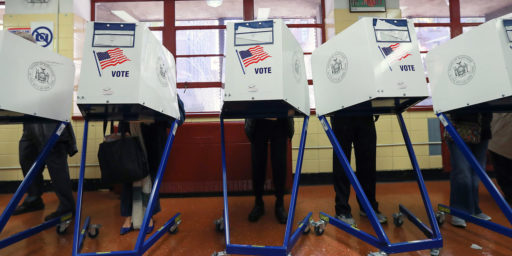
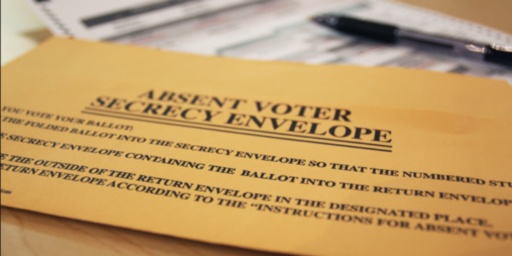
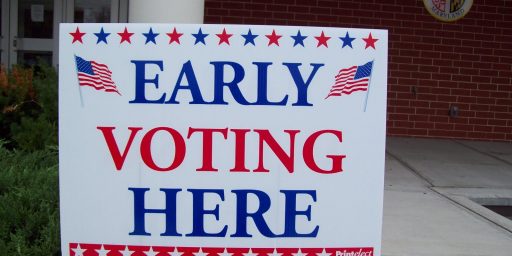
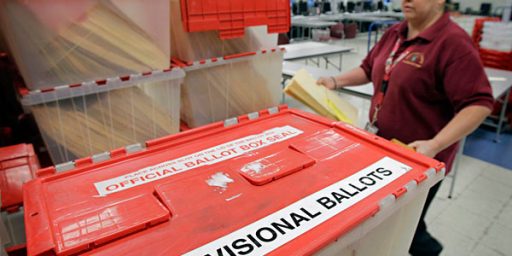

Probably nit-picky here but it seems to me that the term “fraud” is being used incorrectly, and perhaps intentionally to evoke a perception of criminal activity.
In this Georgia situation, if a person who submits a ballot, asserts that he is the voter, or that the voter has authorized the person to submit the ballot of another voter, that is fraud. On the other hand, if that same person does not assert that they have been authorized, then the only infraction is improper submission, but the submitter has not committed fraud.
I’m reminded of tax preparation scams perpetrated by accountants. I’ve read of many such in several countries.
Essentially the accountants prepared the tax returns, quite correctly, then had their clients write checks (this was a while ago) for amounts owed. Except they deposited their checks to their own accounts, or those of an accomplice, usually making changes to the checks in the process. The end result being people still owed taxes.
In two cases, one in Mexico and one in the US, courts held the accountants had defrauded the victims, not the government. Thus they were still required to pay their taxes, and were dependent on the authorities to find, arrest, charge, and prosecute the accountants in order to receive any compensation.
@Bob@Youngstown:
In my reading of the statute, this constitutes as fraudulent handling because of the lack of relationship:
The only exceptions to this are people who are in a medical care facility at the time of the vote and people being held in state/county custody.
Source:
I had no idea True the Vote was still around, let alone in a position to grab the ear of a still semi-respectable Republican office holder. Interesting personal link here: True the Vote was created in response to a voter registration campaign I was directing.
Among other things, the then-leader of True the Vote accused me and this guy of founding and leading the Houston chapter of the New Black Panthers.
Our resulting defamation suit bankrupted the parent organization, King Street Patriots. I had assumed True the Vote folded too. The grift must be too lucrative.
IIRC, the scandal in North (?) Carolina congressional race that the courts ordered rerun due to illegal collection and tampering with the votes, was of course, perpetrated by Republicans. There you go, Rs know that vote fraud is rampant, because R’s are the fraudsters.
@Sleeping Dog:
It’s all projection.
@Sleeping Dog:
Good work.
Mass mailing of ballots and collections of said ballots reeks of Big City machine politics. Mayor Daily famously was asked to provide more votes for the Kennedy election. He replied “how many do you need?”
The other problem with large numbers of mail in ballots is the optics of the counting. When close elections are decided days later with a 80%+ of mail in’s going to 1 party, the losing party immediately questions the results.
Really hard to believe we are hand counting paper ballots in 2022.
@Neil Hudelson:
If it helps, it sounds like they’ve been having issues with major donors:
https://www.usatoday.com/story/news/politics/elections/2020/11/27/fred-eshelman-sues-pro-trump-true-vote-election-lawsuits/6440272002/
@Sleeping Dog:
In fairness, there were other recent examples with Democrats as well. I just grabbed the first example.
@SteveO:
It is hard to believe we are still using hand counted, paper ballots. That said there is a bill in the NH house, sponsored by Rs, to do away with optical scanning for ballot tabulating and return to hand counting. It won’t make it out of committee, but it proves idiocy.
@mattbernius: I often wonder why more big money GOP donors don’t figure out they’re getting conned.
@Matt Bernius:
Again, my nit is with the term “fraud”.
Generally speaking fraud has a victim that has suffered some damage.
In the situation that I ask my neighbor to put my outgoing mail (that incidentally includes a ballot return) in my mailbox on the street, who is the victim and what damage has been done?
My point is that I (the voter), and neighbor may have innocently (no deception) mishandled the transit of the ballot, but it is unreasonable to call either of us as fraudsters.
BTW, notice that the statute repeatedly uses the term “shall”, but switches to “may” when describing those that handle the ballot.
I think it’s always a concern when third parties are handling ballots, particularly organized groups that have likely have a political agenda. Having a reliable ballot chain-of-custody between the voter and election officials is ideal.
So my view is that the standard should be for voters to directly get their ballots to election officials either in person at the polls or via the mail/dropbox as the case may be. There obviously need to be exceptions for people who can’t do that, but they need to be exceptions and should be some kind of oversight for those exceptions, or at least enough security in the system to be confident that third parties are behind honest and are not switching or altering ballots.
The goal ought to be ensuring that an individual’s vote is safely and accurately delivered to election officials for counting.
I’ve mentioned before that I’m the legal guardian for my sister who has dementia. She is no longer mentally competent enough to make a voting choice but here in Colorado, unlike some states, she doesn’t lose the ability to vote due to a court declaring her to be mentally incompetent. And Guardians like me have a lot of authority over our wards, but one authority we don’t have is voting. So I can’t deregister her and she can’t be taken off the voter lists. So every election she gets a ballot mailed to me (Mail voting is the norm in Colorado – almost everyone gets mailed a ballot), which I then shred.
In theory, I could fill out the ballot, try to forge her signature, and send it in. But that would obviously be illegal and unethical and it’s something I would never do. But it illustrates potential problems when third parties – including even family members “help” with collecting votes, particularly when it comes to vulnerable groups like the aged.
Please excuse the many grammar and other errors in my last comment – I think the gist is still clear though.
@SteveO:
I realize it’s a figure of speech, but, depending on the State and the County they are not most likely counting paper ballots by hand (unless we are talking about a recount. For example here is how it’s done in Colorado:
https://www.coloradoan.com/story/news/2020/10/01/colorado-mail-in-ballot-absentee-voting-how-state-perfected-system/3572176001/
Typically the signature check is the only thing that is done by an individual.
Part of the challenge we also face is how distributed election authority can be within States. Often key infrastructure decisions are made at the county level–which only exacerbates the situation I laid out.
As far as the security of voting by mail/absentee, Colorado is a great example of it working (along with a number of other states that have gone full mail-in). And as Steven Taylor regularly writes about, the facts remain that despite all of the fears about voter fraud, it’s still exceedingly rare and typically not on a scale that could possibly sway the vast majority of Federal Elections.
The challenge is that people tend to focus on anedotal stories rather than the evidence at hand.
@Andy:
It came across great. And I think Colorado’s method of universal mail-in ballot is one that I wish other states would copy. It’s not without its flaws, but I think it’s a really good compromise.
@Bob@Youngstown:
That helps me understand. I see how that makes sense. I’m using the term in a legal sense. I definitely agree that the “harm” here is a bit of a challenge to see.
That’s pretty standard for laws (as I’ve come to learn).
@Andy:
First, you should get her to sign it, rather than forging it.
Second, that is a concern with vote by mail, which is basically impossible to get rid of. Unless the voter is coming in person to drop it off, and the vote staff are checking that they are the voter, and doing it in private so a coerced voter can toss their ballot into a shredder or something, there will be instances of a voter being coerced by family.
Is that more or less of a problem than 8 hour lines to vote in some areas? I would say far less.
That’s not just whataboutism, as vote-by-mail is one of the solutions to inequalities in voting access. Balancing the problems of the different systems is how we get to the least worst, with the least distortions.
I would expect that coercion by family and caregivers is less of a problem than people being denied the opportunity to vote in terms of raw numbers, and that coercion is harder to game for political advantage. (I’m open to data that shows the opposite… retirement homes seem like a vulnerability, but again, less so than 8 hour lines for “certain people”)
@Andy:
Unfortunately there a few people who think that it would be justified.
But the thing that I can’t get my head wrapped around is do these people feel that injecting one more vote is worth the risk of a jail sentence? (or do they think that if they illegally vote for the “right” candidate they will be immune of prosecution or be pardoned?)
@mattbernius:
Every time the experts rate the various states’ voting methods for security, accuracy, and ease of use, the top five spots are dominated by western vote by mail states.
Successful election stealing requires numbers of votes so large that it is, for practical purposes, impossible to do using “retail” methods involving individual voters/ballots. It requires “wholesale” cheating in the back office. One of the reasons that contemporary vote by mail systems rate highly on security is because they are designed to make wholesale cheating very, very difficult. In one of the 2020 swing states there were accusations of Democratic operatives introducing tens of thousands of forged ballots into the counting stream. As soon as something like that was attempted in one of the contemporary VBM systems, alarms go off up and down the chain of custody.
I am always surprised by how much of the controversy over vote by mail seems to be regional. In aggregate in the 13-state American West, >90% of all ballots are distributed by mail. Every registered voter will get one in seven of the 13 — CA, CO, HI, NV, OR, UT, and WA. >75% of registered voters will get a mail ballot by a permanent voluntary list in AZ and MT. NM and WY lack permanent lists, but >65% and >30% of registered voters respectively request a mail ballot in federal elections every other year.
@Kathy: @Kathy:
IIRC, isn’t this what Wesley Snipes went to federal prison for?
@Michael Cain:
Republican strategy involves identifying areas with high Democratic support and then making it hell to vote there in hopes a lot of people won’t bother. If everyone can just mail in their ballot, then creating hours long lines to vote is no longer a barrier to participation.
@Gustopher:
She’s too far gone to understand the request and regardless, I’m sure her signature wouldn’t match what is on file.
It’s a concern but a small one. The reality is that no system is perfect. And the question must always be asked, “as compared to what?”
Like Michael Cain said, voting by mail is more secure than most people think as long as it has sufficient security procedures in place. Assuming they are it’s a lot better, IMO, than advocacy groups harvesting ballots like political machines used to do.
So I am a pretty big fan of the system we have here in Colorado even though it’s not perfect and has room for improvement.
My view has long been that one should look at voting systems as systems. Instead of the stupid national conversation on voting that partisans are currently engaged in, I would instead take a systems analysis approach. Mail voting requires different procedures than in-person voting. The systemic points of vulnerability are different and need to be addressed differently.
“Debates” over specific things, like voter ID requirements, elide over this. Voter ID is neither a racist tool for voter suppression, nor a sure-fire security method. Its value depends on its role in the system. Here in Colorado, we do have a voter ID requirement, but it is not onerous.
The details matter.
@SteveO:
I suppose that depends on how much people have been educated about the electoral process. In Australia there are always seats where the result takes days or weeks to be declared, as postal and absentee votes trickle in from around the country. Only the occasional loon complains that something untoward must be going on. Everyone else accepts that millions of ballot papers take a while to find their rightful homes and be counted. I mean who hasn’t had something go missing in the mail for days?
Example:
Ten days! Trump would have melted the Twitter servers in an equivalent situation. Labor accepted Menzies was still prime minister … by 130 votes.